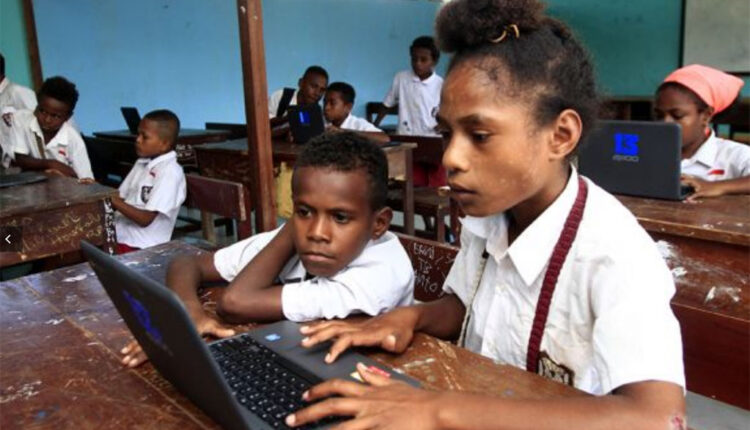
Revitalization of Education Governance Key to Accelerating Papua’s Development
By: Maria Suhiap )*
Revitalization of education governance in Papua is a central issue in accelerating development in the Bumi Cendrawasih region. Papua, as one of the regions with abundant natural resource potential, also holds major challenges in terms of human resource development.
Quality education is one of the main pillars that will determine the success of development in the region. Therefore, improvements in education governance are needed to create superior and competitive human resources, in line with Papua’s long-term development goals.
Head of the BP3OKP Smart Papua Working Group, Drs. Arius Mofu, said that the issue of education governance in Papua has not experienced significant improvement in recent years.
According to him, various policies implemented at the central and regional government levels have not fully succeeded in addressing the fundamental challenges in Papua, such as poverty, stunting, and low quality of education.
Mofu assessed that the revitalization of education governance must start from the formulation of better policies and more effective implementation in the field. Thus, education in Papua can become a strong foundation for the development of the region in the long term.
Mofu also emphasized that the regional government must maintain a strong commitment to implementing the programs that have been formulated in the Papua Development Master Plan for the 2022-2041 Period (RIPPP) and the Papua Development Acceleration Action Plan (RAPPP).
According to him, the two documents are important references for all development programs in Papua, including in the field of education. Every policy and action plan must refer to the documents and be integrated with information systems such as SIPPP, Krisna, SIPD, and SIPKD, which help monitor and coordinate program implementation in the field.
Priority programs such as Healthy Papua, Smart Papua, and Productive Papua, which are listed in the RIPPP and RAPPP, must be implemented consistently and measurably. In the context of education, the Smart Papua Program is one of the main programs aimed at improving the quality of education in the region.
Through the program, the government hopes to create Papuan human resources that are able to compete in the national and international arena. Mofu assessed that the success of this program is highly dependent on good governance and strict supervision from the central and regional governments.
Meanwhile, the Head of the Papua Province Financial and Development Supervisory Agency (BPKP) Representative Office, Zainuri, revealed that the education sector is one of the priorities that will receive intervention for improvements in terms of governance.
His party plans to provide guidance to the Government Internal Control System (SPIP) in Papua Province. This program aims to strengthen governance in various strategic sectors, including education, which is part of the Smart Papua Program. Zainuri sees that education in Papua requires special attention considering its very strategic role in creating superior human resources.
Zainuri also said that synergy between the Government Internal Supervisory Apparatus (APIP) and Law Enforcement Apparatus (APH) is very important in maintaining accountability and transparency in the implementation of education programs in Papua.
With strict supervision, it is expected that all educational programs that have been formulated can run according to plan and provide a positive impact on society. Quality education is the main key for Papua to be able to utilize its natural potential independently and sustainably.
A similar view was also expressed by the Acting Governor of Papua, Major General TNI (ret.) Ramses Limbong. According to him, education is not only about increasing knowledge, but also about forming the character of a more independent and productive society. Human resources that excel in their capacity and competence are a determining factor in the success of development in the Papua region. Education is a very strategic sector in efforts to create community welfare in Papua.
Ramses gave his support to the SPIP coaching activities carried out by BPKP in Papua. According to him, strengthening education governance through SPIP coaching will help ensure that every education program can run effectively and efficiently.
Good governance is essential to ensure that resources allocated to education are used appropriately and provide maximum results. Ramses also added that the local government must continue to commit to improving the quality of education in Papua, because superior human resources are the main prerequisite for achieving community welfare.
Overall, the revitalization of education governance in Papua is an important step in supporting the acceleration of development in the region. With improved governance that includes strict supervision, policy integration, and effective implementation, the education sector in Papua is expected to be able to become a driving force for sustainable development.
Support from various parties, including local governments, BPKP, and educational institutions, is essential to ensure that educational programs can run according to plan and have a positive impact on the Papuan people.
Quality education will not only improve individual capacity, but will also open up opportunities for Papuans to contribute more to economic and social development in the region nicknamed the Golden City. If the revitalization of education governance is carried out properly, Papua has great potential to become one of the centers of superior economic and social growth in Indonesia.
)* The author is a Papuan student living in Bali